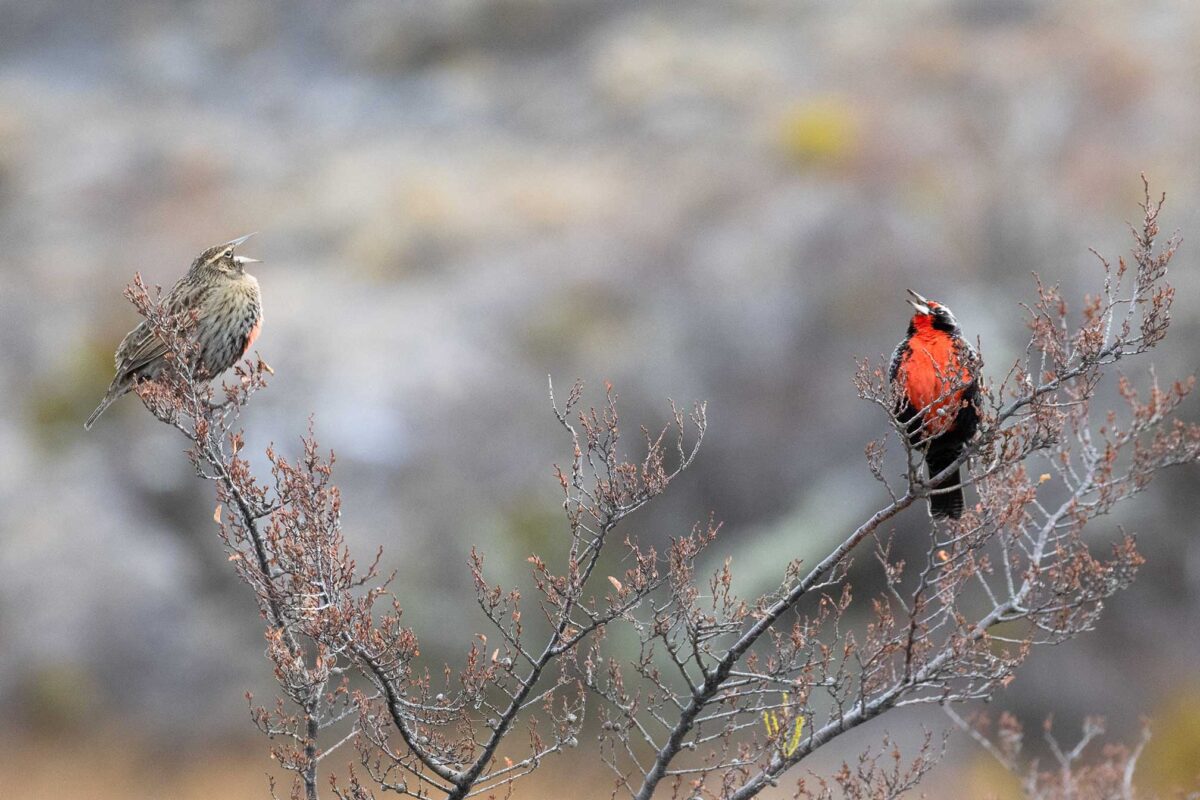 #Columns
#Columns
Why is birdsong good for us?
More than just good for our health, bird sounds are an indicator of nature’s own well-being
 Birds singing in tranquil autumn light at Torres Del Paine, Chile | Image: Lis Leão
Birds singing in tranquil autumn light at Torres Del Paine, Chile | Image: Lis Leão
We live in a world full of sounds, classified for their origin: geophony, like the sound of the wind, the rain, or ocean waves; biophony, sounds produced by living beings, including birds; anthrophony, generated by humans.
This soundscape is with us even when we don’t realize it.
Seeing is different from hearing. We can close our eyes, but not our ears; every sound enters uninvited. Our brains process and identify sounds and, often automatically, decide whether it’s worth our attention.
Constant or irrelevant sounds are, by habit, ignored, such as the tick-tock of a clock. But not all sounds are the same.
The soundscape of a place is made up of everything that can be heard in a certain environment. Natural environments, where geophony and biophony predominate, have been found to have restoring effects on our health.
Among the sounds of nature, birdsong stands out for its beauty, complexity, variation, and, above all, for the effect it has upon us.
Brazil is home to approximately 1,971 bird species, which goes some way toward deepening our sonorous intimacy with them.
Although there is no evidence that birdsong has directly influenced the development of human music, it’s possible that its rich melody intuitively inspired the first forms of human sound expression.
Why does birdsong confer well-being?
Seeing birds or hearing their song gives us an esthetic-emotional experience, often evoking pleasurable memories of childhood.
Data from the Brazilian Institute of the Environment and Renewable Natural Resources (IBAMA) indicate that 4 million birds live in captivity in Brazil, suggesting a human desire to be close to them.
Even with the possibility of appreciating them in their freedom, including in urban areas, keeping birds in captivity seems to bring some kind of satisfaction. Such choices reveal both individual and cultural influences in the relationship between humans and birds.
There is a growing body of scientific evidence to demonstrate that hearing birdsong is associated to benefits for psychological, emotional, and even physiological well-being.
Researchers have shown that bird calls are the most common natural sound associated to perceived stress relief and restored attention, due to their acoustic, esthetic, and associative properties.
Another study has demonstrated that even virtual exposure to birdsong recordings significantly reduces symptoms of anxiety, paranoia, and sadness in healthy adults.
Similarly to the effects of hearing music, natural sounds such as birdsong activate areas of the brain associated to the reward system, such as the nucleus accumbens (NAc), promoting sensations of pleasure and well-being.
These activations are linked to the release of neurotransmitters such as dopamine, which play a crucial role in regulating our humor and motivation.
Another interesting aspect is that birds make us feel serene—not through silence, but through their presence.
They are considered as quality bioindicators for their well-honed sensibility to variations in environmental conditions.
In a way, their presence tells us that we are in a healthy environment.
Sensitive bioindicators
American musician and ecologist Bernie Krause has spent more than 50 years recording sounds in natural environments. In one of his projects he recorded the soundscape of a forest before and after selective extraction of trees, demonstrating that although the visual landscape remained the same, bird sounds had disappeared and did not return, even years later.
Krause also conducted monitoring around the relationship between climate change and sounds, demonstrating that in areas affected by droughts, forest fires, or gradual warming, birds change their vocalization patterns, or simply disappear from the soundscape.
The quantity and diversity of birdsong has dwindled in a number of regions, and bird sounds were heralding losses in biodiversity even before any alterations to the environment were visible.
Birdsong not only has an impact on our own welfare but also indicates nature’s own well-being. Its presence is synonymous with life.
Maybe this is why it has inspired so many poets, composers, and writers, such as Manoel de Barros (1916–2014), who wrote in “O apanhador de desperdícios” (The waste collector):
“Fui aparelhado para gostar de passarinhos (I was wired to like birds).
Tenho abundância de ser feliz por isso (I am abundantly happy for that).”
And it goes beyond the poets, because when the birds sing, there is calm somewhere within us.

Lis Leão is a senior researcher at Hospital Israelita Albert Einstein and head of the e-Nature Research Group for interdisciplinary studies on connections between nature, health, and well-being (CNPq).
Opinion articles do not necessarily reflect the views of Science Arena or Hospital Israelita Albert Einstein.
*
This article may be republished online under the CC-BY-NC-ND Creative Commons license.
The text must not be edited and the author(s) and source (Science Arena) must be credited.




